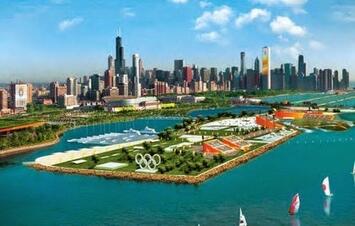
Five years ago, just prior to the announcement by the IOC of who would host the 2016 Olympics, Chicago's bid was assumed to be in a commanding lead. Unfortunately for the Windy City, When the IOC votes were cast on October 2, 2009, Chicago was stunningly eliminated on the first ballot. The speculation was that many international IOC delegates were resentful of another polished bid once again from the U.S., and aggressively sought reasons not to support the Chicago bid. The USOC had been successful in getting Summer Olympics in 1984 (Los Angeles) and 1996 (Atlanta, in a move that particularly stung the international community), and Winter Olympics in 1980 (Lake Placid) and 2002 (Salt Lake City). If you include the 2010 Winter Games in Vancouver and the 1988 Winter Games in Calgary, that would've been six North American Olympics out of 17 site bids years prior to that 2009 vote, or one-third of all Olympic sites over that period. Relatedly, the South American continent has never hosted an Olympics, and there was a strong contingent that supported the expansion of the Olympic brand to meet its true international mission. The beautiful Brazilian city of Rio de Janeiro ultimately won.
How's that working out now?
It appears that Rio's preparation for the 2016 Games is not going well at all. Last week, the Los Angeles Times reported that an IOC vice president spoke out about the lack of progress in Rio. The damning quote:
"We have become very concerned," John Coates told the Australian Associated Press. "And this is against a city that's got social issues that also have to be addressed; a country that's also trying to deal with the FIFA World Cup coming up in a few months."
And those social issues he refers to? Here'sthe Atlantic Cities account of recent events there:
"Clashes last week between favela residents and police in Rio de Janeiro led to flaming barricades, the partial shutdown of the iconic Copacabana neighborhood, and at least one shooting victim. Less than six weeks from the start of the World Cup, Rio and its slums appear to be teetering on the brink of chaos.
Favela residents say they’re protesting human rights violations on the part of police forces. Meanwhile, drug dealers are regaining territory amid the chaos, and authorities are leaning on military reinforcements to keep order."
Here's hoping that things can turn around in Rio and that the city can have a safe and successful 2014 World Cup (slated to start in six weeks, and also plagued with delays) as well as 2016 Olympics. But this also begs the question -- where would Chicago be today had it won the bid in 2009?
I should note by starting that I was a supporter of Chicago getting the Games at that time, so my perceptions of what-could-have-been may be far rosier than someone who was not a supporter. And trust me: not everyone in Chicago was a supporter of the Olympic bid. A Chicago Tribune poll conducted in August 2009 said 47% of respondents supported the bid, while 45% were against it. Dissent came largely from the South Side, where the Olympic Village and many venues for the Games were proposed as an economic development stimulus for the area.
Note: next month, the 2024 Olympics will commence in Paris. Every four years I’m reminded that Chicago very nearly was awarded the 2016 Games by the IOC, but a late pivot by (bribed?) electors made Rio de Janiero the winner. I saw this as a watershed moment for the city, and still do. At my previous blog I wrote about the failed effort twice, once in 2014 and as a repost with a postscript in 2016. Today I’m bringing back the 2016 version. Tomorrow I’ll post a more thorough “what if” on a Chicago after a successful 2016 Olympics, informed by what we know of what’s taken place in the last eight years. Look for that content tomorrow.
-Pete
Read the rest of this piece at The Corner Side Yard.
Pete Saunders is a writer and researcher whose work focuses on urbanism and public policy. Pete has been the editor/publisher of the Corner Side Yard, an urbanist blog, since 2012. Pete is also an urban affairs contributor to Forbes Magazine's online platform. Pete's writings have been published widely in traditional and internet media outlets, including the feature article in the December 2018 issue of Planning Magazine. Pete has more than twenty years' experience in planning, economic development, and community development, with stops in the public, private and non-profit sectors. He lives in Chicago.
Photo: Rendering of Chicago in 2016, had the Olympics been awarded to the city. Ah, what could have been. Source: Chicago Bid Book via chicago.curbed.com












